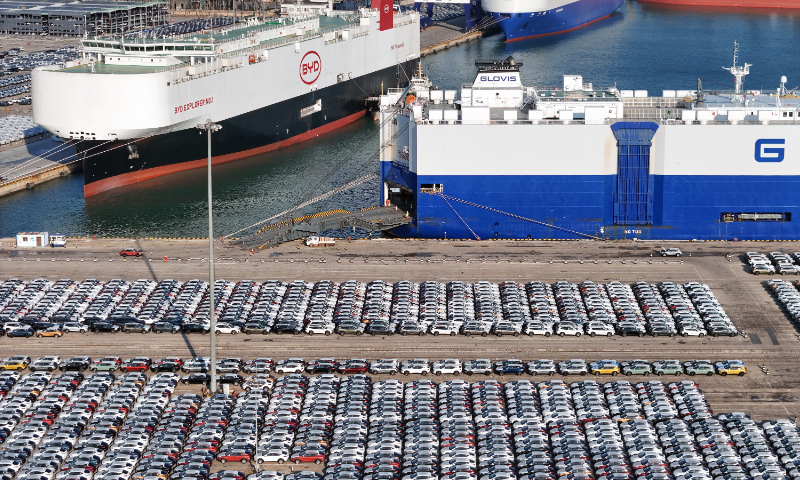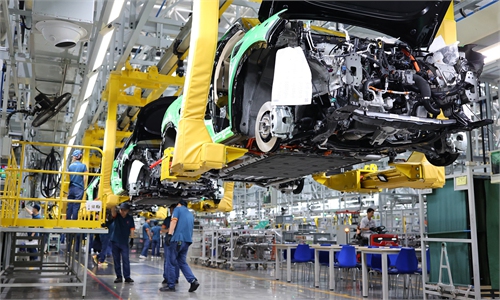
A large number of China-made cars are waiting for shipment for export at Yantai Port, East China's Shandong Province, on January 10, 2024. Photo: VCG
China's auto industry has showed a remarkable performance at the beginning of the year as the output, domestic sales and exports all rose year-on-year in January, with the growth momentum set to persist all year.
Data from the China Association of Automobile Manufacturers (CAAM) showed that 2.41 million cars were produced in January, up 51.2 percent year-on-year. Sales reached 2.439 million, up 47.9 percent.
Analysts said on Wednesday that the figures may reflect a low year-earlier base and the release of demand during the 2024 Spring Festival holidays, boosted by promotional activities, but it is undeniable that the industry has showed a stable trend of growth.
"If the industry's scale and technology reach certain levels, it is possible for some Chinese carmakers to shift from typical buyer-seller operations to exporters of technology, standards and services in the global market," Wu Shuocheng, a veteran automobile analyst, told the Global Times on Wednesday.
For instance, electric car producer BYD announced on December 22 last year that it will build a manufacturing plant for new-energy vehicles (NEVs) in Szeged, Hungary, and it signed a land purchase deal with the local government at the end of January 2024.
As one of the world's largest NEV firms, BYD is ready to bring our highly advanced technologies and automated manufacturing lines to Hungary to facilitate the local electric vehicle development, said BYD Chairman Wang Chuanfu.
In addition, Chinese lithium-ion battery giant CATL and Netherlands-based carmaker Stellantis NV plan to cooperate in producing electric car batteries in Europe, indicating that China's NEV-related technologies are recognized in the international market.
Wu said that China's carmakers should use cutting-edge technologies that have the potential to change the whole industry, such as artificial intelligence, as well as new marketing strategies.
CAAM's data also reflected the momentum of China's NEV sector. The output of NEVs reached 787,000 units in January, up 85.3 percent year-on-year, and sales stood at 729,000, up 78.8 percent. China exported 101,000 NEVs in the same month, up 21.7 percent.
The fast development of NEVs made a great contribution to China's auto exports and boosted the country's general exports as well, said Wu.
As the CAAM announced China's 2023 auto exports of 4.91 million, it marked that China had overtaken Japan, with 4.42 million auto exports, as the world's largest auto exporter.
"China has advantages in the auto industry chain and effective policy support, which may keep China's auto manufacturing sector at the global leading level in 2024," said Wu, despite some countries' protectionism.
Regarding recent US and EU protectionist actions against Chinese car exports, Chinese Foreign Ministry spokesperson Mao Ning said on Tuesday that turning normal trade activities into security and ideological issues is actually a loss of one's own long-term development and has encumbered the progress and prosperity of the world.
The leapfrog development of China's auto sector has provided cost-effective products with high quality to the world, said Mao during a regular press conference, adding that every one in three exported automobiles from China is an electric model, which contributes significantly to the world's green and low-carbon transition.

